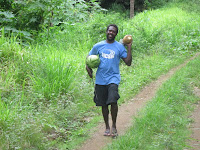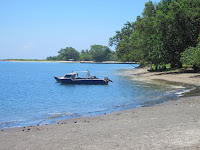Monday, August 8, 2011
On Funerals:
A funeral, or “ded”, is perhaps the most emotive occasion I've witnessed in Vanuatu. Some of our volunteers think they are false showings of socially mandated grief while others talk about legitimate and culturally appropriate expressions of communal loss. Maybe. Here's what I've seen.
The first was in the village of Malvasi. That was close enough to my village to make attendance a social obligation for me and my host family. The church's elder had died the night before and word quickly spread. He had died at the hospital on the North end of the island and the body was taken back to Malvasi by truck in late afternoon. I had seen a truck loaded with crying people pass by, but at the time didn't know what to make of it. That evening we received word about the death of the important man from Malvasi and we knew that we would be going over there in the morning.
After breakfast, people in the village put on their nice church going clothes (trousers and collered shirts for the men, island dresses for the women) and we started a small parade down the road. Most people, including me, carried a folded pandanus mat or some cloth that would be given to the family of the deceased. We walked over to the other village, our group growing a little as we went and based on the chatter and even laughing you wouldn't have guessed we were headed toward a mourning ceremony. As we got closer to Malvasi, I began to hear the wailing and the talking in the group from my village died down.
We arrived at about the same time as the delegation from another village and began to walk towards the back of Malvasi were the wailing was coming from. There is sort of a “zone of mourning” at these events. As we began to approach the house of the dead elder, we saw small groups of people, mostly men, not too distant and it was only polite to shake hands with them. The body was wrapped in mats and cloth and laying on the ground just outside of the dead man's house. A tarp had been erected for shade and underneath was a swarm of seated wailing women.
You would have thought it the end of the world, the racket that was raised. Our visiting group and the delegation from the other village approached the body and the circle of seated mamas when people just started crying... loudly. Loudly enough, in fact, that anyone nearby would be sure to take note of just who had come to pay their respects. The mats and calico were placed on a growing pile of gifts for the family or sometimes into the hands of a crying mama seated near enough to toss them onto the heap. After five to ten minutes, most people, especially the men, peeled off from the group and sat around the village. Their crying ceased, but the general tumult at the house of the deceased continued.
Then, we sat aound, which I'm getting increasingly good at. I talked with men who were perfectly affable now, having finished shedding tears and crying out loud just a few minutes prior. So, we chatted and waited.
Eventually, we moved to a crowded church where the crying ceased long enough for the minister to give a sermon. The crying and wailing promptly started again and the body was carried to a recently dug grave on the edge of the village. The man's brothers, uncles, and other male relatives buried the mat wrapped body and family members each through in a handful of dirt before the men set to finishing the job with shovels. By now, the crying had mostly ceased with the exception of some very earnest and heartfelt crying from the widow.
We went to the village nakamal were food was to be distributed to the village delegations. First, the burial squad had to march down to the ocean to wash their hands, feet, and shovels in the saltwater. After, thanks were given to those who had traveled to show their respect and piles of food given to them to see them on their way.
With minor variation, that's the pattern I saw a few more times. Having arrived to the office one day, my counterpart told me that a woman about forty minutes' walk South had passed away. The morning's work in the office would have to wait until after we had gone to “show our faces”. We did and my counterpart managed some spontaneous tears for a few minutes near the body, but then we headed back to the office in time for lunch and started our work.
In case I sound a bit unfeeling about all this, let me tell you what it was like when someone in my extended host family died. I had an “apu man” or grandfather in Wenia. When passing by the village, I would try to stop by and say hello to him and we got along well enough. Although I didn't understand enough of his language and he didn't know enough Bislama for us to converse much, he had heard that I was to be his grandson for two years and treated me like one. He was a nice man who took the time to see any visitors despite being sick and always liked to give his grandchildren roasted peanuts when he saw them.
I was sad to hear one day that he had died. My host family and I walked the hour and half to Wenia on top of a steep hill and this time we were the one's under the tarp receiving visitors. Of course, I wouldn't be going to work for the next five days as I would be making daily trips to Wenia. My host father would spend the nights there with some of grandpa's other closest relatives. Although Apu was burried the day after he died, for five days villages came to pay their respects and cry at the man's house. For my own part, I tried to be respectful, but unobtrusive, trying not to be a tourist intruding on my host family's grief, but also fully aware that this man I liked was not really my grandfather.
Five days having passed, we were allowed to shave and wear clean clothes again and my host papa returned to stay with us. He had been busy cooking, seeing to visitors in Wenia, and taking care of the surprising amount of details that attend any funeral. On my daily pilgrimages, the most I could really do to help was fetch water for the cooks.
After thirty days, there was one more trip to Wenia, but mourning is finished. There will be a last visit at the one year mark and that's it.
On the occasion of a funeral, things just stop. There was a death of an important minister in Northern Epi and the opening ceremony of a new nakamal in a nearby village was postponed so as not to conflict with the dead man's five days. A cooking competition in Laman Bay was canceled because everyone would be too busy attending the mourning of a boy who had died. He died on far off Tanna, but was from Laman Bay and had family members there so locals came to them to cry. Mourning may be compulsory depending on distance and importance of the dead person. But, after the designated time, it's finished and life moves on and everyone smiles again.
-- Daniel --
 After a return from one of my trips to another village, I found my host family diligently cleaning our area by the ocean. Vanuatu seems to constantly going through both Spring and Autumn at the same time and leaves are always falling. Still, when you visit the villages you won't see much debris about. That little house is a shed my host papa built to hold bags of dried copra until the copra ship comes. The family and any visitors will sometimes gather down here on hot afternoons, especially on Saturdays after church, to enjoy the breeze coming off the ocean.
After a return from one of my trips to another village, I found my host family diligently cleaning our area by the ocean. Vanuatu seems to constantly going through both Spring and Autumn at the same time and leaves are always falling. Still, when you visit the villages you won't see much debris about. That little house is a shed my host papa built to hold bags of dried copra until the copra ship comes. The family and any visitors will sometimes gather down here on hot afternoons, especially on Saturdays after church, to enjoy the breeze coming off the ocean.

 This is the road just North of my village. Notice the giant banyan/nambanga tree on the right. The road is pretty good during the dry season and my island even has a few trucks.
This is the road just North of my village. Notice the giant banyan/nambanga tree on the right. The road is pretty good during the dry season and my island even has a few trucks. Visitors to Epi can stay at the Paradise Bangalow (sic) in Laman Bay, one of the bigger businesses on the island.
Visitors to Epi can stay at the Paradise Bangalow (sic) in Laman Bay, one of the bigger businesses on the island. I think that's Ambrym on the left and Lopevi on the right as seen from Nikaura village in North Epi. Ambrym is the much bigger of the two islands, but is further away. At night if the Ambrym volcano is active you can see a red glare above the island.
I think that's Ambrym on the left and Lopevi on the right as seen from Nikaura village in North Epi. Ambrym is the much bigger of the two islands, but is further away. At night if the Ambrym volcano is active you can see a red glare above the island.




























